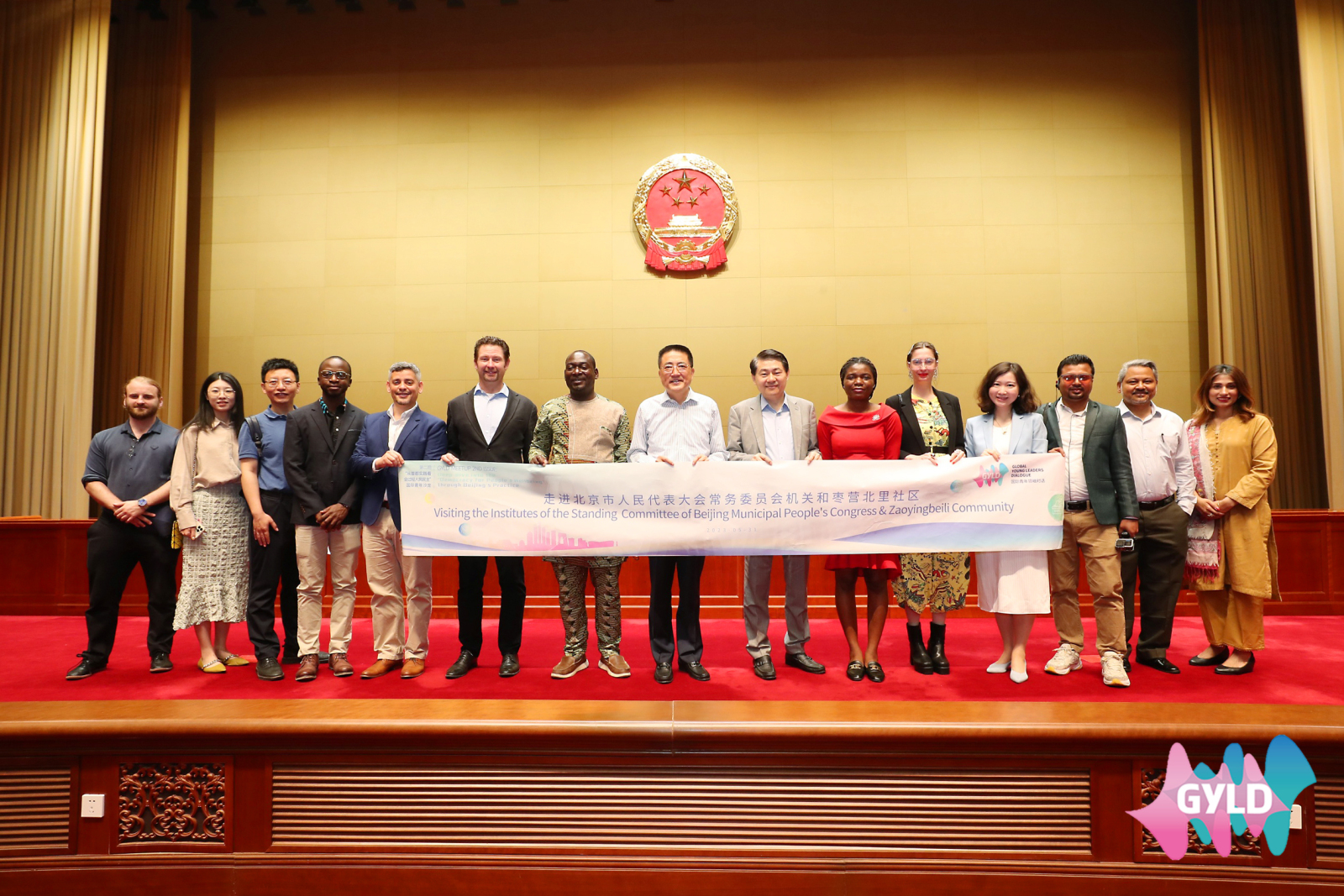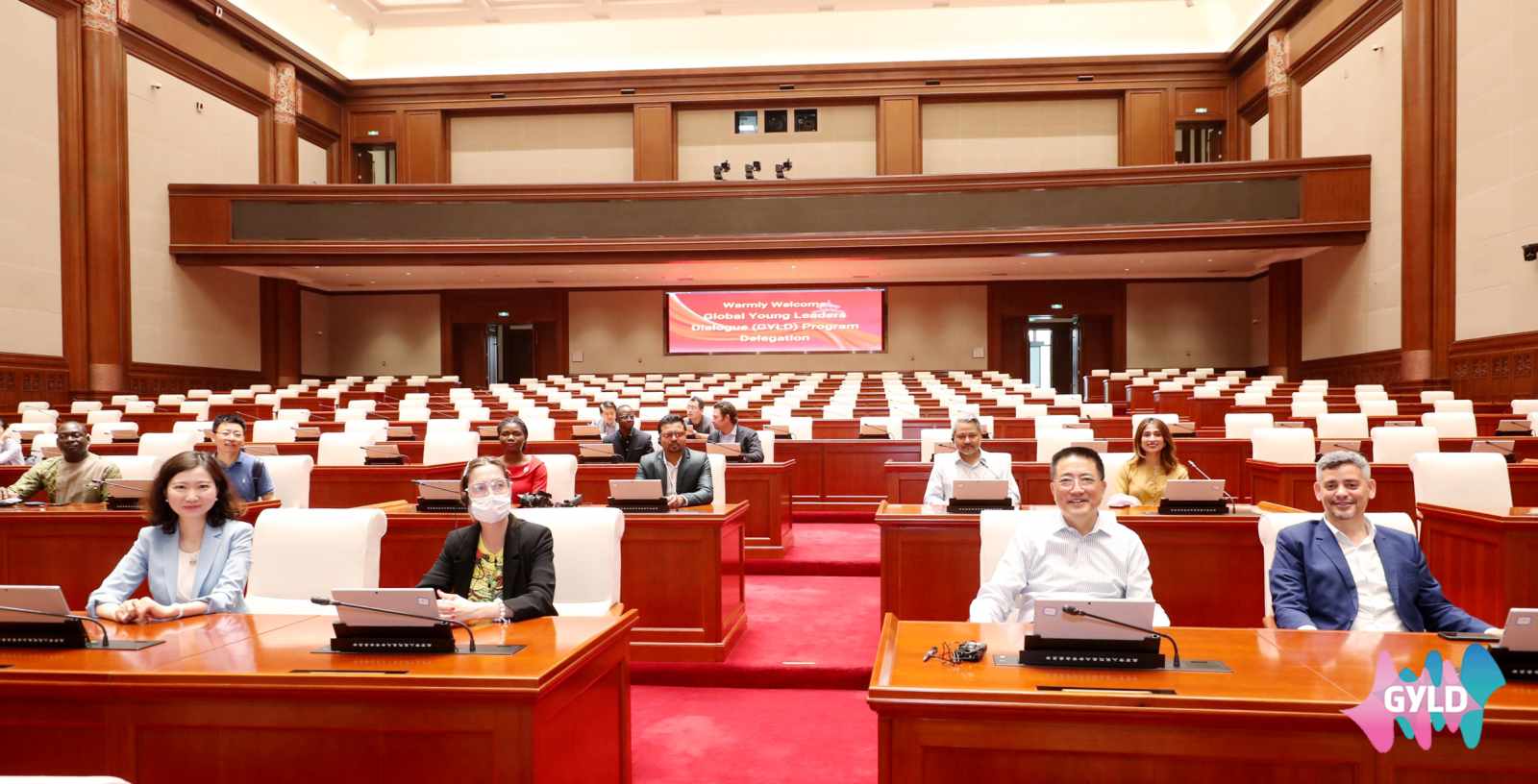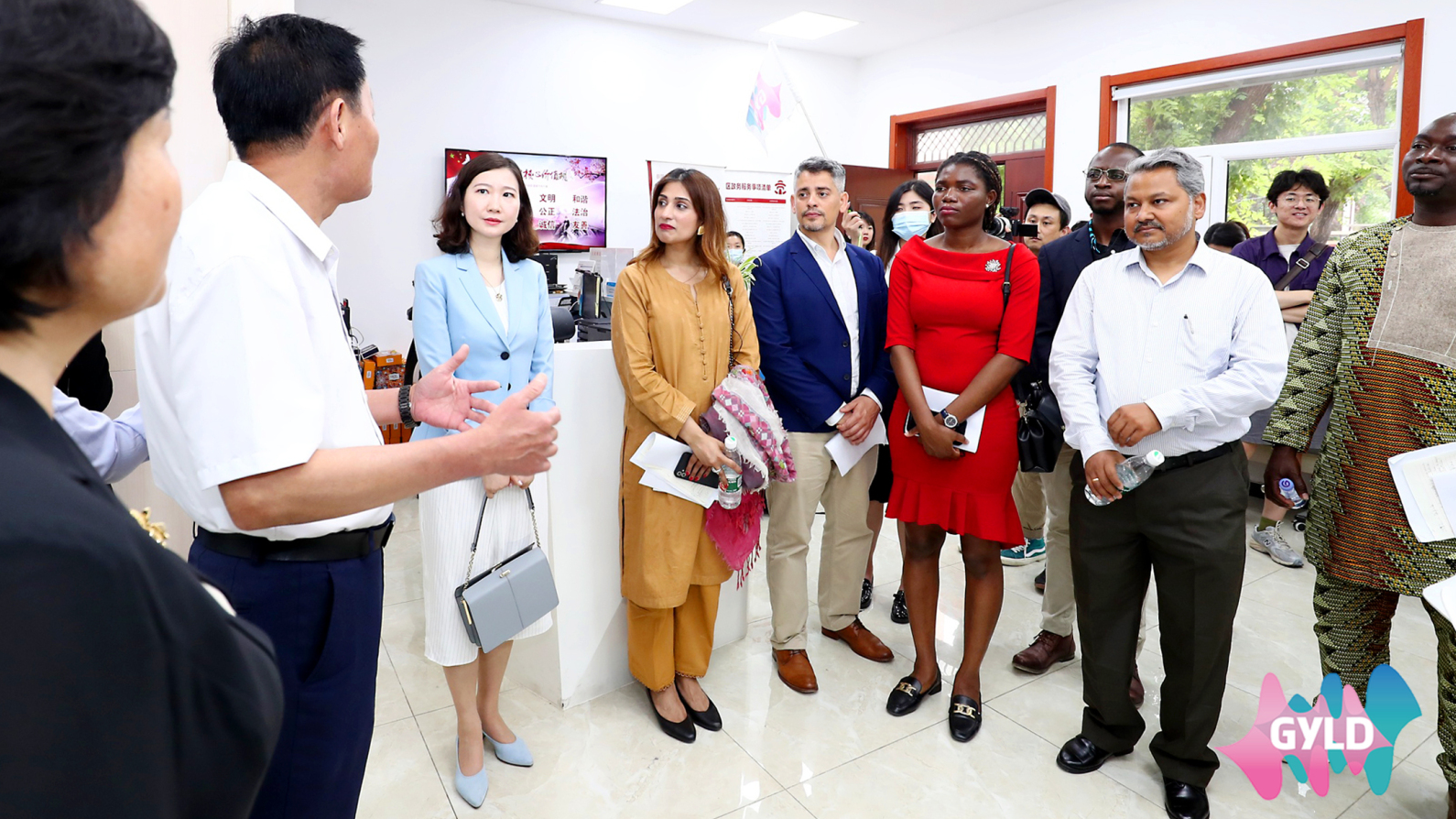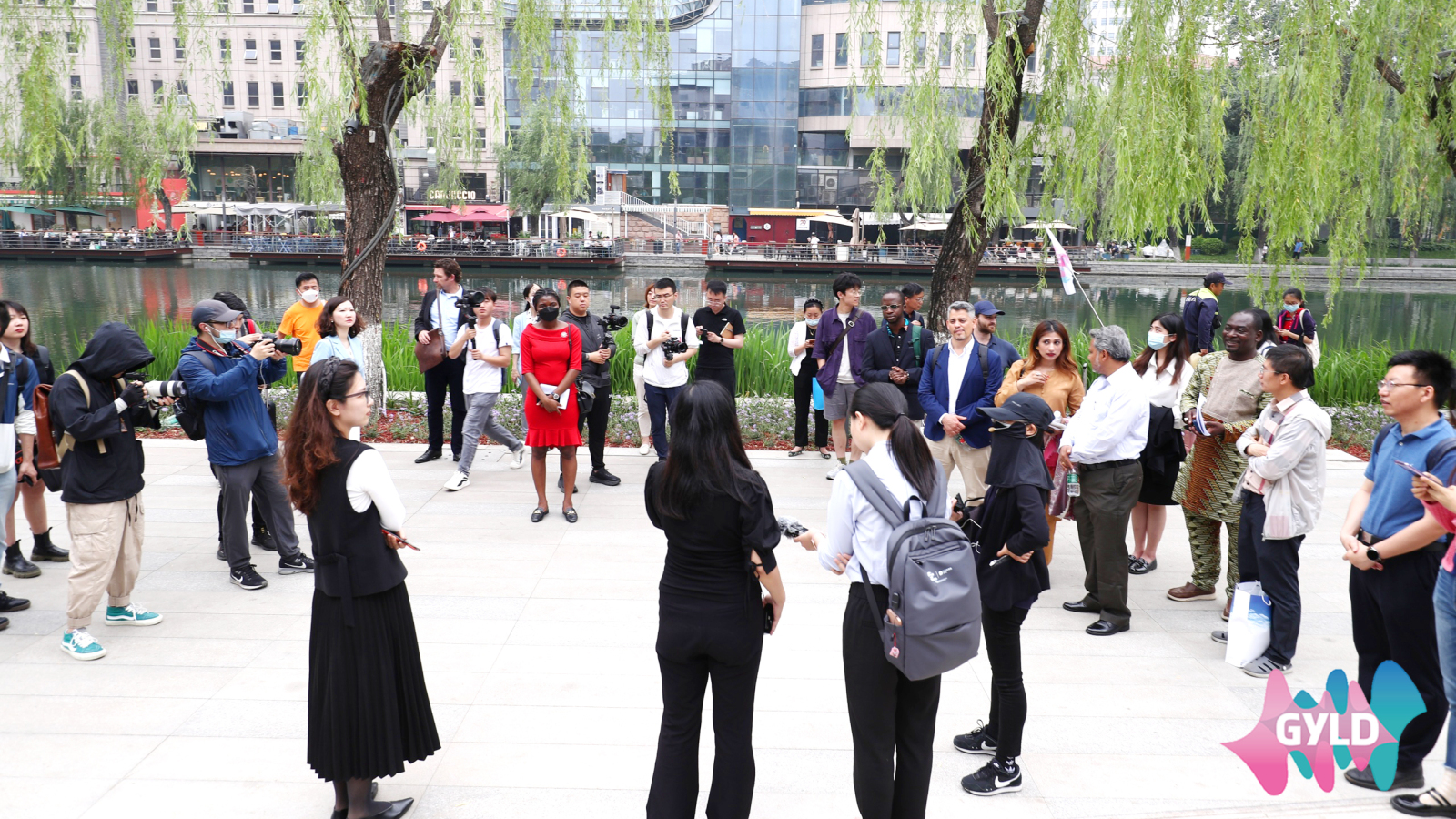
A group of foreign youth representatives visited the Beijing Municipal People's Congress as part of the program titled "Chinese Modernization and Whole-Process People's Democracy" organized by the Center for China and Globalization (CCG) under its Global Young Leaders Dialogue (GYLD) initiative, Beijing, China, May 31, 2023. /CCG
A group of foreign youth representatives visited the Beijing Municipal People's Congress as part of the program titled "Chinese Modernization and Whole-Process People's Democracy" organized by the Center for China and Globalization (CCG) under its Global Young Leaders Dialogue (GYLD) initiative, Beijing, China, May 31, 2023. /CCG
Editor's note: Abhishek G Bhaya is a senior journalist and international affairs commentator. The article reflects the author's opinions and not necessarily the views of CGTN.
Democracy has long been considered a cornerstone of modern governance, allowing citizens to participate in decision-making processes and holding their representatives accountable. While different countries adopt various models of democracy, China's whole-process people's democracy stands out as a unique approach.
I, along with a group of young international researchers and scholars, recently had the opportunity to delve into China's democratic process as part of a day-long program that included a visit to the Beijing Municipal People's Congress and interaction with local representatives; a walk across the Liangma He Riverfront exploring its phenomenal transformation as a model urban public space; and a visit to the neighboring Zaoying Beili Community to understand community participation in local governance.
The program titled "Chinese Modernization and Whole-Process People's Democracy" was organized by the Center for China and Globalization (CCG), a Beijing-headquartered think tank, as part of its Global Young Leaders Dialogue (GYLD) initiative. It offered a unique chance for us to witness the whole-process people's democracy at work, through an open dialogue with the Congress representatives and grassroots cadres working at the community level.
During the program, we got to witness and appreciate China's unique approach to governance that embraces the principles of grassroots participation, deliberative decision-making, public consultation and transparency.
China's system is responsive to the needs of its citizens, with laws specifically tailored to address both immediate and long-term visions. It is also inclusive with all tiers of the society getting equal opportunity to get appointed as people's representatives at the congress. The emphasis on meritocracy also stood out, as the Chinese system engages in a constant dialogue between the people and public servants, assimilating new practices to meet the population's evolving needs.
The program was also able to clarify the misconceptions about China's governance system that prevails in some parts of the world due to a sustained misinformation campaign by a section of the international media. "China has established its government to be people-centered with Chinese characteristics. Unlike its reputation as a purely authoritarian state, I noticed that China has embraced fragmentation in its political system under the whole-process people's democracy," Itunu Grace Ishola, a Nigerian master's student at Peking University, said.
Foreign scholars laud China's governance system

Participants at the meeting hall of the Standing Committee of the Beijing Municipal People's Congress, Tongzhou District, Beijing, May 31, 2023. /CCG
Participants at the meeting hall of the Standing Committee of the Beijing Municipal People's Congress, Tongzhou District, Beijing, May 31, 2023. /CCG
It was interesting to notice how foreign participants lauded the efficacy of China's governance system while also comparing it with the prevailing systems in their home countries.
"One of the distinct features of China's whole-process people's democracy is the 'hierarchical trust' process. That is, it is a process whereby people taking part in more important decision-making processes are those that have been chosen by people themselves at the lower level," noted Patrice Monkam, a Cameroonian PhD scholar at Tsinghua University. "In contrast, in my country and many other countries, individuals can participate directly in the voting process without going through a previously chosen representative," he added.
Jose Renato Peneluppi Jr., a Wuhan-based Brazilian lawyer and an expert on Chinese public administration, highlighted that in his country, democracy is often equated with the act of voting, with elections becoming the highest manifestation of this process. The Chinese approach, in contrast, prioritizes results and employs a digital infrastructure to collect and analyze data, ensuring actions are based on verifiable scientific information. "Results are at the center of China's whole-process people's democracy," he stressed.
Zoon Ahmed Khan, a Pakistani national, and a research fellow at the Belt and Road Institute, Tsinghua University, Beijing, reckoned that the whole-process people's democracy is a much more efficient form of governance and provides a model that other countries can learn from. "In many other countries, there's an attitude that citizens are the recipients of policies, but in China, citizens are not only recipients, but they are part of that process to make better policies and better conditions a reality."
"China and my home country have different approaches to democracy," remarked Bangladeshi national Mohammad Saiyedul Islam, a doctoral fellow at the School of International Trade and Economics, Jiangxi University of Finance and Economics. "The Chinese government places a strong emphasis on maintaining social stability and economic development," he noted, stressing that this approach has worked remarkably for the development of the country.
Community development and vibrant urban planning

Zaoying Beili Community officials explain to the foreign scholars how welfare policies are efficiently implemented at the grassroots level, Chaoyang District, Beijing, May 31, 2023. /CCG
Zaoying Beili Community officials explain to the foreign scholars how welfare policies are efficiently implemented at the grassroots level, Chaoyang District, Beijing, May 31, 2023. /CCG
The visit to Zaoying Beili Community showcased the effectiveness of Chinese urban planning and community development. The community serves as a model for fostering a sense of belonging and social cohesion among its residents.
In Zaoying Beili, citizens are not just recipients of policies but active participants in the decision-making process, working together to improve their living conditions. The community's success lies in its ability to harness the wisdom and subjective initiative of residents, creating a model that other countries can learn from.
Effective governance in the community involves mobilizing and empowering residents, and services are prioritized based on the needs of differently-abled individuals and senior citizens. We learned how China's urban planning and community development systems are need-driven, addressing challenges raised by the people and aligning with the people-centered philosophy of the Communist Party of China (CPC).

Foreign scholars were shown around the Liangma He Riverfront highlighting its phenomenal transformation as a model urban public space, Chaoyang District, Beijing, May 31, 2023. /CCG
Foreign scholars were shown around the Liangma He Riverfront highlighting its phenomenal transformation as a model urban public space, Chaoyang District, Beijing, May 31, 2023. /CCG
The Liangma He Riverfront development exemplifies China's commitment to creating vibrant spaces that enhance citizens' quality of life. This development, with its integration of culture, tourism, and business, adds an aesthetic charm to the surrounding area. The riverfront becomes a place where citizens can relax, fostering a positive atmosphere and promoting a sense of well-being. The Liangma He Riverfront serves as a testament to China's vision of combining economic development with environmental sustainability and cultural preservation.
The success of community development in Zaoying Beili and the aesthetic transformation of the Liangma He Riverfront highlight the effectiveness of China's governance model in fostering citizen empowerment, social cohesion, and overall well-being. As foreign scholars and professionals continue to engage with China's governance system, a deeper understanding of its culture, people, and government can be attained, contributing to broader discussions on democratic practices worldwide.
(If you want to contribute and have specific expertise, please contact us at opinions@cgtn.com. Follow @thouse_opinions on Twitter to discover the latest commentaries on CGTN Opinion section.)